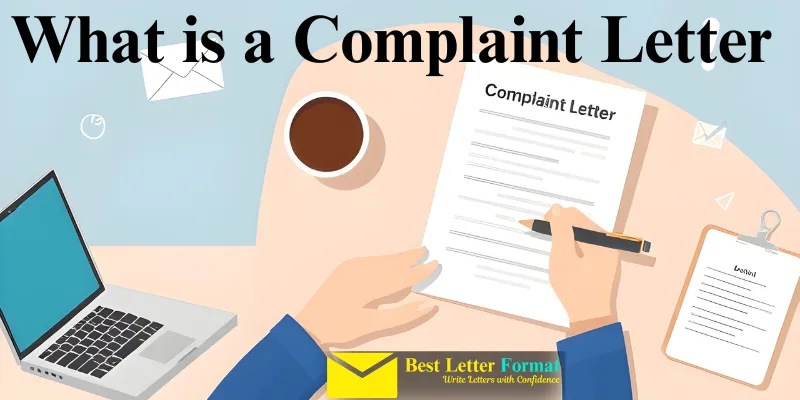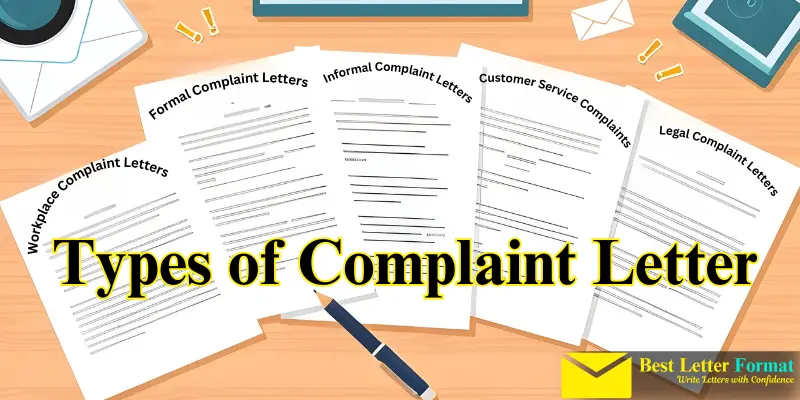What Is a Complaint Letter? A Simple Guide to Its Importance
Published: 4 Dec 2024
Have you ever been frustrated with a product or service that didn’t meet your expectations? Maybe it was a gadget that stopped working within days or a service that left you feeling ignored. When that happens, what do you do? Most of us complain to friends or vent on social media. But there’s a better, more effective way—a complaint letter.

A complaint letter isn’t just a piece of paper or an email; it’s your chance to communicate your problem clearly and professionally. Let me tell you something from my own experience. Once, I ordered a phone case online, and when it arrived, it was completely scratched up! Instead of wasting time arguing over the phone, I wrote a simple complaint letter to the company. Guess what? They not only replaced the case but also gave me a discount on my next order. That’s the power of a well-written complaint letter.
In this article, I’ll walk you through everything you need to know about complaint letters. We’ll start by understanding what is a complaint letter why it’s such an important tool for addressing problems professionally. You’ll also learn about the different types of complaint letters, from formal to informal, and when to use them. Along the way, we’ll explore the features that make a complaint letter effective, like clarity, structure, and tone. I’ll also share the advantages of writing a complaint letter, such as getting faster resolutions, as well as some of the challenges you might face.
By the end, you’ll feel confident in writing a complaint letter that grabs attention and gets results, whether it’s about a faulty product, poor service, or workplace concerns. So, ready to dive in? Let’s get started!
1. What Is a Complaint Letter?
A complaint letter is a formal way to express dissatisfaction regarding a product, service, or situation that did not meet expectations. Often referred to as claim letters or adjustment letters, these documents help address issues professionally and maintain a record for future reference.
Typically written by a customer to an individual or organization, a complaint letter outlines the problem, requests a specific resolution, and seeks to resolve the situation efficiently. Its purpose is not only to address grievances but also to establish accountability and promote better service standards.
2. Why Complaint Letters Are Important
Complaint letters are essential for resolving issues effectively while maintaining professionalism. Here’s why they matter:
- Resolve Conflicts: Address issues with products, services, or organizations formally and efficiently.
- Maintain Professionalism: Allow you to express dissatisfaction politely, avoiding emotional outbursts.
- Clear Communication: Ensure your concerns are explained in detail, leaving no room for misunderstanding.
- Create an Official Record: Written complaints serve as proof of the issue for future reference.
- Strengthen Consumer Rights: Hold businesses accountable and encourage them to improve their standards.
- Encourage Quick Action: Formal letters often prompt organizations to respond faster compared to verbal complaints.
- Improve Service Quality: Feedback from complaint letters helps companies identify and fix recurring issues.
- Build Confidence: Writing a complaint letter empowers you to take control of the situation professionally.
Whenever you face an issue, writing a complaint letter ensures your voice is heard and increases the chances of resolution.
3. Types of Complaint Letters
Complaint letters can be categorized into different types based on their purpose and tone. Here’s a breakdown with brief details for each type:

1. Formal Complaint Letters
Used in professional settings and follows a structured format to address higher authorities or organizations.
- Business Complaint Letters: Address issues like delayed deliveries or policy violations affecting business operations.
- Customer Service Complaint Letters: Highlight dissatisfaction with a product or service to seek resolution.
- Legal Complaint Letters: Written to address disputes like breaches of contracts or property matters.
- Corporate Complaint Letters: Raise concerns about unethical practices or organizational failures.
- Public Utility Complaint Letters: Focus on problems with electricity, water, or telecom services.
- Medical Complaint Letters: Report inadequate treatment, misdiagnosis, or billing errors.
- Educational Complaint Letters: Address issues with schools or universities regarding academics or facilities.
- HR Complaint Letters: Report workplace issues such as harassment or discrimination to the HR department.
- Financial Complaint Letters: Focus on errors in banking, loans, or insurance claims.
- Policy Change Requests: Request changes in organizational policies for better operations.
2. Informal Complaint Letters
Written casually for personal or community grievances, often less structured.
- Neighbor Complaint Letters: Resolve issues like noise disturbances or boundary disputes amicably.
- Personal Service Complaints: Highlight problems with domestic workers or local service providers.
- Local Community Complaint Letters: Focus on shared concerns like poor waste management.
- Friends and Family Complaints: Address misunderstandings or grievances in personal relationships.
- Small Business Complaints: Report faulty goods or delays by local vendors.
- Rental Property Complaints: Inform landlords about maintenance or neighbor-related issues.
- Event Feedback Letters: Provide constructive criticism about event arrangements or management.
- Casual Online Service Complaints: Report grievances with small-scale online sellers.
- Pet Service Complaints: Address issues with pet sitters, trainers, or grooming services.
- Travel Complaints: Highlight concerns like delays or mismanagement with informal travel organizers.
3. Customer Service Complaints
Focused on dissatisfaction with products or services, aiming for faster resolutions.
- Defective Product Complaints: Report broken or malfunctioning items like electronics or clothing.
- Late Delivery Complaints: Highlight delays in receiving goods beyond the promised date.
- Poor Service Experience Complaints: Address rude staff behavior or lack of support.
- Misleading Advertisement Complaints: Report false claims made in marketing campaigns.
- Warranty Claim Letters: Request repair or replacement of products under warranty.
- Subscription Service Complaints: Focus on issues with magazines, streaming platforms, or memberships.
- Utility Service Complaints: Address billing errors or disruptions in basic services.
- Restaurant Complaints: Report poor food quality or unhygienic conditions.
- Hotel Complaints: Highlight issues with cleanliness, amenities, or staff behavior.
- Airline Service Complaints: Focus on concerns like lost luggage, delayed flights, or overbooking.
4. Legal Complaint Letters
Formal documents addressing disputes governed by legal regulations.
- Contract Breach Letters: Highlight failures to honor agreed terms or conditions.
- Property Dispute Complaints: Report issues like boundary encroachments or unauthorized use.
- Consumer Protection Complaints: Focus on violations of consumer rights or unfair trade practices.
- Trademark Infringement Complaints: Address misuse of registered intellectual property.
- Fraudulent Transaction Complaints: Report unauthorized charges or online scams.
- Defamation Complaint Letters: Respond to libel or slander affecting reputation.
- Employment Law Complaints: Address wrongful termination or unpaid wages.
- Tax-Related Complaints: Report discrepancies in tax calculations or filing errors.
- Insurance Dispute Letters: Resolve issues regarding denied claims or unclear policies.
- Personal Injury Complaints: Seek compensation for accidents or medical negligence.
5. Workplace Complaint Letters
Address employee concerns to ensure a healthy work environment.
- Harassment Complaint Letters: Report workplace bullying, verbal abuse, or harassment.
- Discrimination Complaint Letters: Address unfair treatment based on race, gender, or religion.
- Unfair Treatment Complaints: Highlight instances of favoritism or biased decision-making.
- Salary Discrepancy Complaints: Focus on unpaid wages or incorrect salary calculations.
- Unsafe Working Conditions: Report safety hazards like faulty equipment or lack of training.
- Improper Conduct Complaints: Highlight misconduct by supervisors or colleagues.
- Overtime Policy Complaints: Address unrealistic or unpaid overtime demands.
- Promotion Disputes: Focus on concerns related to overlooked promotions.
- Attendance Policy Complaints: Address grievances over strict or unfair attendance rules.
- Technology or Tool Complaints: Report malfunctioning equipment or outdated software affecting productivity.
4. Uses and Features of Complaint Letters
Complaint letters are more than just a way to express dissatisfaction—they are practical tools for solving issues. Here’s how they are commonly used and the features that make them effective:
Uses of Complaint Letters
- Resolving Product or Service Issues: Companies rely on complaint letters to identify and fix problems like defective items or delayed deliveries.
- Requesting Compensation or Action: Customers use them to demand refunds, repairs, replacements, or apologies.
- Escalating Unresolved Problems: If your initial complaint is ignored, a formal letter ensures the issue reaches decision-makers.
- Maintaining Documentation: Written complaints act as official proof in case of follow-ups or legal proceedings.
- Encouraging Business Accountability: Complaint letters push businesses to address customer concerns and improve services.
- Improving Workplace Conditions: Employees use these letters to report harassment, unsafe environments, or unfair practices.
- Highlighting Ethical Concerns: Complaint letters often bring attention to unethical practices, prompting change.
- Legal Resolution: They serve as a starting point for resolving disputes involving contracts, finances, or property.
- Building Consumer Awareness: These letters empower customers to stand up for their rights and demand fair treatment.
- Promoting Service Excellence: Constructive feedback in complaint letters helps businesses enhance customer satisfaction.
Features of Complaint Letters
- Clarity in Communication: Clearly state the issue, including key details like dates, receipts, or product specifics.
- Professional Tone: Use polite, respectful language to convey concerns without appearing aggressive.
- Well-Organized Format: Complaint letters follow a structure that includes:
- Introduction: Briefly explain the purpose of the letter.
- Body: Provide detailed information about the issue, including evidence.
- Conclusion: Clearly state the resolution you’re expecting.
- Action-Oriented Content: Be specific about what you want—refunds, repairs, or policy changes.
- Supporting Evidence: Attach relevant documents like bills, photographs, or warranty cards.
- Constructive Feedback: Instead of just highlighting problems, suggest improvements where possible.
- Brevity: Keep the letter focused and avoid irrelevant details.
- Positive Closing: End the letter by thanking the recipient for their time and requesting a follow-up.
5. Advantages and Disadvantages of Writing a Complaint Letter
While writing a complaint letter helped me resolve my issue, I realized there were both advantages and challenges in the process. On the positive side, I achieved a clear resolution and felt empowered as a consumer. However, the waiting time and effort required to craft the letter were notable drawbacks. Let’s explore the pros and cons:
Advantages of Writing a Complaint Letter
Writing a complaint letter can be a game-changer when it comes to resolving issues. Here are its key benefits:
- Clear Communication: A complaint letter helps you present your issue in an organized and detailed way, ensuring there is no room for confusion or misunderstanding.
- Professionalism: By using polite and respectful language, you maintain a professional tone, which encourages businesses to take your concerns seriously.
- Record Keeping: It creates a documented record of your issue, which is helpful for follow-ups, future references, or even legal actions if required.
- Consumer Empowerment: Complaint letters empower you to take charge of the situation and communicate your dissatisfaction in a structured way, boosting your confidence as a customer.
- Encourages Accountability: Businesses often act faster when there’s a formal complaint, as it holds them accountable for their products or services.
- Improves Service Quality: Your feedback helps organizations identify flaws in their processes, enabling them to improve customer satisfaction.
- Legal Support: A well-written letter can act as strong evidence in legal disputes, especially when backed with proper documentation.
- Promotes Ethical Practices: Regularly addressing unethical behavior or substandard products forces businesses to maintain higher quality and ethical standards.

Disadvantages of Writing a Complaint Letter
While complaint letters are highly effective, they do come with some challenges. Here are the drawbacks:
- Delayed Response: There’s no guarantee that your letter will result in immediate action, and you may have to wait days or even weeks for a reply.
- Impersonal Process: Larger organizations might respond with generic templates, making the process feel automated and disconnected.
- Lack of Resolution: Even a well-written letter sometimes fails to achieve the desired result, leaving the issue unresolved.
- Time-Consuming: Writing a detailed and professional letter takes significant time and effort, especially if the issue is complex.
- Overlooked Complaints: Some companies prioritize social media or other communication channels over written complaints, delaying responses.
- Emotional Frustration: Waiting for a resolution or not receiving a reply can increase your dissatisfaction with the problem.
- Dependency on Documentation: Without proper supporting evidence, such as receipts or photos, your letter may lose its impact and effectiveness.
(FAQs) About Complaint Letters
If you want to express dissatisfaction professionally, complaint letters are the best option. They help solve problems, stay professional, and keep a record for later. Here are common questions about complaint letters to help you write them effectively.
How do you write a complaint?
To write a complaint, start with a polite and clear introduction, explaining the issue you’re addressing. Include details like dates, receipts, and descriptions of the problem to provide context. End with a specific request for resolution and a professional closing.
What is a good example of a complaint letter?
A good example is addressing a delayed product delivery. For instance, you could write to the company, explain the delay, provide order details, and request compensation or a replacement. The tone should remain respectful and solution-focused.
What is the formal definition of a complaint?
A complaint is a formal expression of dissatisfaction about a product, service, or experience. It highlights an issue that needs resolution and is often submitted in writing to maintain clarity and a record. Complaints aim to rectify problems and hold parties accountable.
What are the characteristics of writing a letter of complaint?
A good complaint letter is clear, concise, and professional. It includes specific details about the issue, a proposed resolution, and maintains a polite tone. Structuring the letter with an introduction, body, and conclusion ensures clarity.
Why are complaint letters important?
Complaint letters resolve issues by presenting them in a structured and professional way. They give consumers a voice, hold businesses accountable, and provide a formal record for future reference. Moreover, they encourage companies to improve their services and address concerns promptly.
What are the main types of complaint letters?
Complaint letters include formal letters for businesses, informal grievances, customer service complaints, legal disputes, and workplace concerns. Each type caters to specific situations, like reporting faulty products or raising workplace issues. Selecting the right type ensures your concerns are addressed effectively.
What should I avoid in a complaint letter?
Avoid aggressive or emotional language, as it reduces the impact of your complaint. Stay specific and avoid vague descriptions or unrealistic demands. Always maintain a respectful tone and focus on the solution.
Can a complaint letter really make a difference?
Absolutely, a well-written complaint letter often leads to faster resolutions. Companies value constructive feedback and are more likely to respond positively to clear and respectful complaints. It also helps highlight systemic issues for better service improvements.
How long should a complaint letter be?
A complaint letter should ideally be one page long. Focus on the key issue, provide necessary details, and avoid unnecessary information. Keeping it concise ensures that your letter gets attention and is acted upon.
What documents should I include with my complaint letter?
Attach any supporting documents like receipts, invoices, photos, or prior correspondence. These provide evidence and strengthen your case. Always reference the attachments within the letter for clarity.
Conclusion
Writing a complaint letter is a powerful step toward resolving issues and ensuring your voice is heard. Whether you’re addressing a faulty product or an unresolved workplace grievance, a well-written letter can make a difference. Here’s what we’ve covered:
- Why It Matters: Complaint letters resolve problems while maintaining professionalism and building accountability.
- Different Types: From workplace concerns to customer service complaints, they cover a wide range of scenarios.
- Uses and Features: Clear communication, actionable requests, and a structured format are key to their success.
- Advantages: Complaint letters empower consumers, create a record, and improve service standards.
- Disadvantages: They can face delays, be time-consuming, or fail to achieve the desired resolution.
Have you ever written a complaint letter? Did it work for you, or did you face challenges along the way? We’d love to hear your thoughts! Share your experiences in the comments below your feedback can inspire others to take action!

- Be Respectful
- Stay Relevant
- Stay Positive
- True Feedback
- Encourage Discussion
- Avoid Spamming
- No Fake News
- Don't Copy-Paste
- No Personal Attacks

- Be Respectful
- Stay Relevant
- Stay Positive
- True Feedback
- Encourage Discussion
- Avoid Spamming
- No Fake News
- Don't Copy-Paste
- No Personal Attacks








